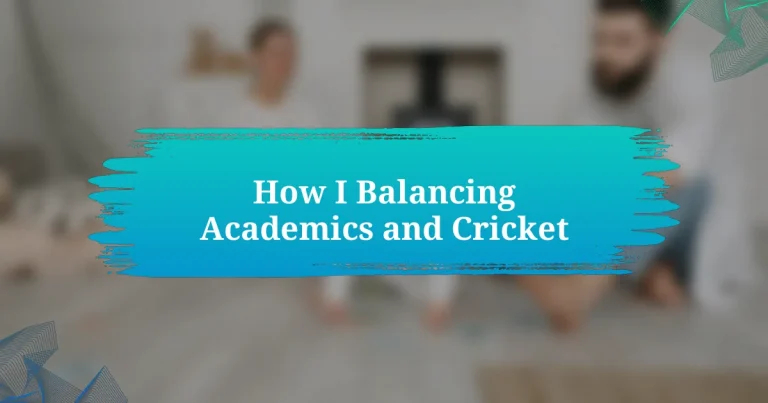Key takeaways:
- Cricket is a symbol of national pride in Bangladesh, with significant milestones like gaining Test status in 2000 and impressive performances in the 2015 World Cup.
- Effective time management strategies, including creating schedules and prioritizing tasks, are essential for young athletes balancing academics and sports.
- Building a supportive network of friends, coaches, and family helps manage the dual commitments of cricket and studies.
- Personal experiences highlight the importance of making choices that align with goals, demonstrating that success in academics and sports can fuel each other.
Overview of cricket in Bangladesh
Cricket in Bangladesh is more than just a sport; it’s a deep-seated passion that unites millions across the nation. I still vividly remember the excitement of watching Bangladesh first secure their Test status in 2000. The roar of the crowd and the adrenaline in the air were electrifying, leaving no doubt in my mind about cricket’s place in our hearts.
From the vibrant streets of Dhaka to the rural villages, you can feel cricket comes alive. During my college days, I often found myself playing in informal matches, where the thrill of hitting a six or taking a wicket could instantly lift spirits. Isn’t it fascinating how a simple game can break down barriers and bring people together, regardless of their background?
In recent years, the national team has achieved significant milestones, creating a sense of pride among fans. I remember the joy of the 2015 World Cup, where Bangladesh exceeded all expectations and filled stadiums with supporters donning their colors. These moments not only highlight the talent emerging from the country but also emphasize cricket’s role in shaping our national identity. How do you think our achievements have influenced the youth’s aspirations in Bangladesh?
Strategies for effective time management
Time management is essential for balancing academics and cricket, especially for young athletes in Bangladesh. One effective strategy I’ve found is creating a detailed weekly schedule. I remember setting aside specific blocks of time for studying, practice, and rest. By doing so, I was able to see my commitments clearly, which significantly reduced my stress levels. Does anyone else find that having everything laid out visually makes it more manageable?
It’s also crucial to prioritize tasks. When I was juggling my academic assignments with cricket training, I would use the Eisenhower Matrix, a tool that categorizes tasks based on urgency and importance. This helped me focus on what needed immediate attention, which was particularly invaluable during exam weeks. Have you ever felt overwhelmed by too many tasks? Trust me, breaking them down can make all the difference.
Lastly, I’ve learned the importance of saying no sometimes. While it’s tempting to accept every invitation for a cricket match, I made a commitment to prioritize my academic responsibilities first. I distinctly recall missing a few friendly games to study for an important exam, but it paid off in the end. How do you ensure you stay focused on your goals? Balancing both worlds requires discipline and sometimes tough choices, but it’s entirely achievable.
Building a supportive network
Building a supportive network is truly essential for anyone trying to balance academics and cricket. In my experience, surrounding myself with friends who understood these dual commitments made a massive difference. They often reminded me of my priorities, especially during the intense study periods before exams. Have you ever had friends who encouraged you during tough times?
I also found that communicating with my coaches was key. They were not just mentors on the field; they understood the demands of study and always offered flexibility when I needed extra time for academic commitments. I remember a particular time when I had to miss practice for a crucial exam. My coach was understanding and even helped me catch up later. Doesn’t it feel good when someone supports your growth, both academically and athletically?
Moreover, involving my family played a significant role as well. I shared my academic schedule and cricket commitments with them, which fostered an environment of understanding and support at home. It was comforting to know that my parents were always there, cheering me on for both my study milestones and cricket matches. Do you have open conversations with your family about your goals? It truly makes navigating both worlds a little more manageable.
Personal experiences in managing both
I’ve found that time management was an essential skill I had to develop early on. There were days I juggled late-night study sessions and early morning practices. I remember one night I had a significant match the next day, and I was knee-deep in revision for a big exam. The pressure was on, and I thought about what it meant to truly excel in both areas. Have you ever felt that crunch? For me, creating a strict schedule—dedicating specific hours for each—really helped me stay focused.
Another personal experience that stands out is learning to prioritize tasks. There was an instance when I had a test and a cricket tournament on the same weekend. I clearly remember prioritizing study time on the days leading up to the test but still managed to squeeze in practice sessions. By communicating my needs to my teammates, I ensured I was still present for their support without compromising my grades. It really boils down to making choices that align with your goals, doesn’t it?
One of the emotional highs I’ve experienced came after a particularly challenging week. I aced a test and played a crucial role in a tight match. I felt an incredible sense of achievement that was deeply rewarding. That week taught me that success in one area could fuel the other. Isn’t it empowering to see how your hard work pays off, both in the classroom and on the field? Balancing academics and cricket has its hurdles, but those moments of triumph make it all worthwhile.

